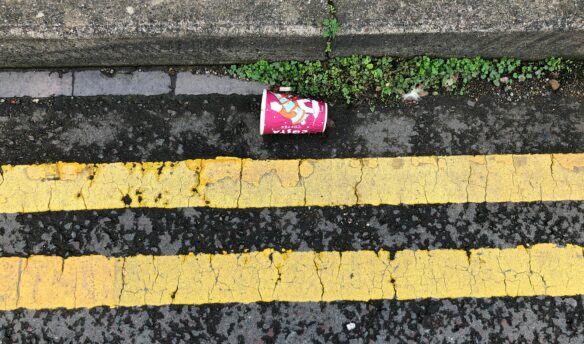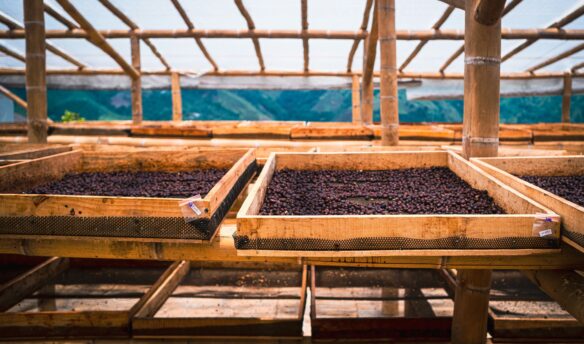Meet the man attempting to visit every single Starbucks on earth. Plus, 23 years after being evicted from their land for a coffee farm, Ugandans await compensation, and Korean brands expand abroad.
‘Ugandans Still Waiting for Coffee Plantation Compensation’ – via DW News
In 2001, the Ugandan government agreed to lease more than 6,000 acres of land to a subsidiary of the German green coffee conglomerate Neumann Kaffee Gruppe (NKG). The aim was to create a sprawling coffee farm north of the capital city of Kampala.
However, there was a problem: thousands of people lived on that land.
To make room for the farm, more than 4,000 people were forced to leave their homes (other sources put the number at 2,000), many of whom were evicted by force. For 23 years, the people who were evicted have been seeking compensation, resulting in a complex web of lawsuits and complaints that is still not fully resolved.
At the heart of the issue is who owns the rights to the land. A 2022 study on the case detailed Uganda’s complicated land rights. Technically, the block of land in question was under private ownership and could legally be sold.
However, thousands lived on the land, and Uganda’s constitution recognizes more informal “customary tenure.” According to the study authors, customary tenure should “protect smallholder farmers’ access to land. However, in Uganda and elsewhere, administration of formal tenure systems leaves peasant farmers on shaky ground.”
In response to the lawsuits, NKG argued that the deal they made was signed in good faith, emphasizing in its chronology of events that the land was privately owned. In this particular case, the Uganda Investment Authority purchased the land from a private owner and then transferred it to NKG’s subsidiary, Kaweri Coffee Plantation, on a 99-year lease.
NKG claimed that the government compensated 166 families who were forced to move. However, the corporation also acknowledged that some families were driven off their land by the Ugandan military after refusing to relocate.
Scola Namuyanja was one of those who refused to move and was eventually removed by force. She talked about broken government promises: “We heard President Yoweri Museveni announce that he had given our land to investors and that we would be compensated for all our property—our land, our house, our crops,” Namuyanja told DW News about the deal in 2001.
Residents were promised new land on which the government would build a school and health center, but according to Namuyanja, that promise was never fulfilled. Then, they were driven out. “There was no school, no hospital—not even a water source. That’s why we didn’t move. When the deadline expired, army soldiers came and evicted us by force.”
Since 2002, evicted tenants have fought for compensation for the loss of their homes and farms. Initially, they sought €30 million, and they reached a final agreement in 2021. However, the compensation package proposed was less than €1 million, and even that still hasn’t been paid.
Namuyanja and others refused to accept this settlement—they want their land returned to them. Uganda’s High Court is now considering another lawsuit regarding the return of the land.
‘Korean Coffee Franchises Expand Globally amid Growing K-Food Popularity’ – via Business Korea
Korea’s coffee market is heating up. While foreign brands flock to open stores in the country, its home-grown coffee chains are expanding into new markets abroad.
We have written about the rapid growth of the Korean coffee market: Korea now has over 100,000 coffee shops, and competition between cafes is brutal. Multinational corporations like Starbucks, Dunkin’, Tim Hortons, and Cotti Coffee have also entered this already booming market.
Now, numerous local brands are looking to expand in foreign markets in the face of waning opportunities for growth at home. Hollys, which has around 550 locations in Korea, opened a store in Osaka, Japan; MegaMGC Coffee (1,500 locations) expanded into Ulaanbaatar, Mongolia; and Ediya Coffee (3,800 locations) opened a store in Guam with plans to expand into Malaysia.
Business Korea notes that more brands are looking overseas because of the Korean Wave or Hallyu, a term used to describe the increasing global popularity of Korean culture over the past three decades. K-pop, K-dramas, and K-food have powered the wave and brought new interest to other aspects of Korean culture, like coffee.
“This cultural movement has paved the way for Korean coffee franchises to introduce their unique offerings to a global audience,” Business Korea reports. And it’s proving popular: Hollys’ Yakgwa Cream Latte (based on a traditional Korean confection) is outselling more conventional coffee drinks like Americanos at its Japanese location.
‘What Can Visiting More Than 19,000 Starbucks Teach You About Life? Ask a Man Named Winter.’ – via Slate
There’s a man named simply Winter, whose life goal is to visit every Starbucks in the world.
Since 1997, Winter says he has visited 19,521 Starbucks locations in all 50 states and 70 different countries—when he began, the company had 1,500 stores. He documents each visit in detail on his website and orders the same thing every time: a regular drip coffee, sometimes drinking ten per day as he checks off multiple locations in a row.
At the rate he’s going (he’s visited an average of 723 stores a year), it’d take him another 26 years to go to all 38,587 Starbucks locations worldwide.
It’s a remarkable feat, and it becomes even more incredible considering how many Starbucks locations there are. Slate describes his journey as Sisyphean for good reason: earlier this year, Starbucks opened 364 new cafes in 13 weeks.
This quest will never end, but Winter continues.
‘Starbucking,’ as he calls his hobby, is also a way for Winter to experience unusual or unvalued places and communities. “The path from one Starbucks to another takes me through these residential areas, weaving my way through these back areas that most tourists will never see,” he told Slate.
Winter prefers contract and remote work, which allows him to live on the road and visit Starbucks in his spare time. And, somehow, even more incredibly, he’s not the only one doing this. Sebastian Birr, a German Starbucker, began the hobby in 2006 at 14—somehow, before he discovered Winter’s website—and has visited more than 6,300 stores.
It really is worth reading the whole piece, but Winter sums up the appeal of using a multinational chain coffee company like Starbucks as the basis for his quest: “As someone who has traveled extensively, when I have been on the road for several hours and I get to a place that is unfamiliar, I appreciate that Starbucks gives me something that is familiar, to sort of anchor me.”
More News
‘Energy Trader Hartree Plans to Acquire the Owner of Volcafe‘ – via Daily Coffee News
‘Coffee Trader NKG Expands into China to Tap Surging Demand‘ – via Reuters
‘Are Blue States More Coffee-Obsessed Than Red States? One Study Says Yes‘ – via Sprudge
‘Global Coffee Platform Recognises New Sustainability Schemes’ – via Global Coffee Report
‘Roast Summit is Coming to the Chicago Area in October’ – via Daily Coffee News
‘Now There Is A Pumpkin Spice Slurpee (Or PSLurpee If You Will)‘ – via Sprudge
‘Two Webinars on the New USDA Organic Rules Coming Soon‘ – via Daily Coffee News
‘Changes Are Coming To The 2025 US Coffee Championships’ – via Sprudge’
The Week in Coffee Unionizing
As bargaining over a foundational contract at Starbucks continues, stores are still filing to unionize.
So far, 15 locations across the country filed to unionize with Workers United in August, including workers at stores in Florida, Arkansas, Pennsylvania, Connecticut, and more.
“We are told as workers that we are essential partners in creating a welcoming and relaxing third space for our customers, while in the same breath that we have not earned the staffing we need to actually create that space,” the workers wrote in a letter to Starbucks CEO Laxman Narasimhan.
The letter continues: “Our customers’ wait times have exploded while our staffing has shrunk; our income has diminished as our hours have been cut; and our health has declined as our workload has increased. We are drawn in with the promise of benefits Starbucks describes as industry leading, yet struggle against the company to get the minimum hours we need to actually qualify for those benefits.”
Beyond the Headlines
‘On Finding Joy in Coffee’ by Ashley Rodriguez
‘How the Pacific Northwest Became the Birthplace of Roadside Espresso Stands’ by Harry Cheadle
















